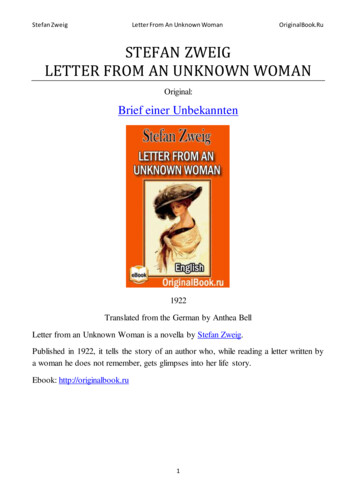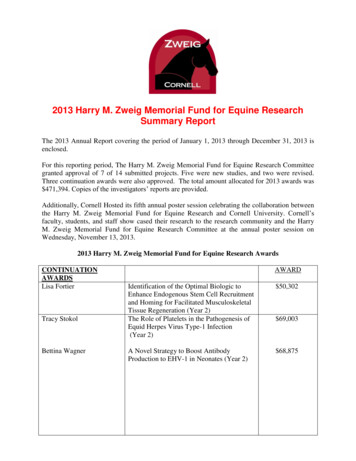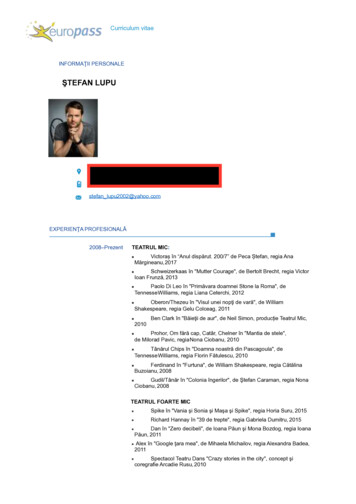
Transcription
Stefan ZweigLetter From An Unknown WomanOriginalBook.RuSTEFAN ZWEIGLETTER FROM AN UNKNOWN WOMANOriginal:Brief einer Unbekannten1922Translated from the German by Anthea BellLetter from an Unknown Woman is a novella by Stefan Zweig.Published in 1922, it tells the story of an author who, while reading a letter written bya woman he does not remember, gets glimpses into her life story.Ebook: http://originalbook.ru1
Stefan ZweigLetter From An Unknown WomanOriginalBook.RuLetter From An Unknown Woman. Stefan ZweigWHEN R., the famous novelist, returned to Vienna early in the morning, after arefreshing three-day excursion into the mountains, and bought a newspaper at therailway station, he was reminded as soon as his eye fell on the date that this was hisbirthday. His forty-first birthday, as he quickly reflected, an observation that neitherpleased nor displeased him. He swiftly leafed through the crisp pages of the paper,and hailed a taxi to take him home to his apartment. His manservant told him thatwhile he was away there had been two visitors as well as several telephone calls, andbrought him the accumulated post on a tray. R. looked casually through it, opening acouple of envelopes because the names of their senders interested him; for the momenthe set aside one letter, apparently of some length and addressed to him in writing thathe did not recognize. Meanwhile the servant had brought him tea; he leant back in anarmchair at his ease, skimmed the newspaper again, leafed through several otheritems of printed matter, then lit himself a cigar, and only now picked up the letter thathe had put to one side.It consisted of about two dozen sheets, more of a manuscript than a letter and writtenhastily in an agitated, feminine hand that he did not know. He instinctively checked theenvelope again in case he had missed an explanatory enclosure. But the envelope wasempty, and like the letter itself bore no address or signature identifying the sender.Strange, he thought, and picked up the letter once more. It began, “To you, who neverknew me,” which was both a salutation and a challenge. He stopped for a moment insurprise: was this letter really addressed to him or to some imaginary person?Suddenly his curiosity was aroused. And he began to read:My child died yesterday—for three days and three nights I wrestled with death for thattender little life, I sat for forty hours at his bedside while the influenza racked his poor,hot body with fever. I put cool compresses on his forehead, I held his restless littlehands day and night. On the third evening I collapsed. My eyes would not stay openany longer; I was unaware of it when they closed. I slept, sitting on my hard chair, forthree or four hours, and in that time death took him. Now the poor sweet boy lies therein his narrow child’s bed, just as he died; only his eyes have been closed, his clever,dark eyes, and his hands are folded over his white shirt, while four candles burn at thefour corners of his bed. I dare not look, I dare not stir from my chair, for when thecandles flicker shadows flit over his face and his closed mouth, and then it seems as ifhis features were moving, so that I might think he was not dead after all, and will wakeup and say something loving and childish to me in his clear voice. But I know that he2
Stefan ZweigLetter From An Unknown WomanOriginalBook.Ruis dead, I will arm myself against hope and further disappointment, I will not look athim again. I know it is true, I know my child died yesterday—so now all I have in theworld is you, you who know nothing about me, you who are now amusing yourselfwithout a care in the world, dallying with things and with people. I have only you,who never knew me, and whom I have always loved.I have taken the fifth candle over to the table where I am writing to you now. For Icannot be alone with my dead child without weeping my heart out, and to whom am Ito speak in this terrible hour if not to you, who were and are everything to me?Perhaps I shall not be able to speak to you entirely clearly, perhaps you will notunderstand me—my mind is dulled, my temples throb and hammer, my limbs hurt somuch. I think I am feverish myself, perhaps I too have the influenza that is spreadingfast in this part of town, and I would be glad of it, because then I could go with mychild without having to do myself any violence. Sometimes everything turns darkbefore my eyes; perhaps I shall not even be able to finish writing this letter—but I amsummoning up all my strength to speak to you once, just this one time, my belovedwho never knew me.I speak only to you; for the first time I will tell you everything, the whole story of mylife, a life that has always been yours although you never knew it. But you shall knowmy secret only once I am dead, when you no longer have to answer me, whenwhatever is now sending hot and cold shudders through me really is the end. If I haveto live on, I shall tear this letter up and go on preserving my silence as I have alwayspreserved it. However, if you are holding it in your hands, you will know that in thesepages a dead woman is telling you the story of her life, a life that was yours from herfirst to her last waking hour. Do not be afraid of my words; a dead woman wantsnothing any more, neither love nor pity nor comfort. I want only one thing from you: Iwant you to believe everything that my pain tells you here, seeking refuge with you.Believe it all, that is the only thing I ask you: no one lies in the hour of an only child’sdeath.I will tell you the whole story of my life, and it is a life that truly began only on theday I met you. Before that, there was nothing but murky confusion into which mymemory never dipped again, some kind of cellar full of dusty, cobwebbed, sombreobjects and people. My heart knows nothing about them now. When you arrived I wasthirteen years old, living in the apartment building where you live now, the samebuilding in which you are holding my letter, my last living breath, in your hands. Ilived in the same corridor, right opposite the door of your apartment. I am sure youwill not remember us any more, an accountant’s impoverished widow (my mother3
Stefan ZweigLetter From An Unknown WomanOriginalBook.Rualways wore mourning) and her thin teenage daughter; we had quietly becomeimbued, so to speak, with our life of needy respectability. Perhaps you never evenheard our name, because we had no nameplate on the front door of our apartment, andno one came to visit us or asked after us. And it is all so long ago, fifteen or sixteenyears; no, I am sure you don’t remember anything about it, my beloved, but I—oh, Irecollect every detail with passion. As if it were today, I remember the very day, no,the very hour when I first heard your voice and set eyes on you for the first time, andhow could I not? It was only then that the world began for me. Allow me, beloved, totell you the whole story from the beginning. I beg you, do not tire of listening to mefor a quarter of an hour, when I have never tired of loving you all my life.Before you moved into our building a family of ugly, mean-minded, quarrelsomepeople lived behind the door of your apartment. Poor as they were, what they hatedmost was the poverty next door, ours, because we wanted nothing to do with theirdown-at-heel, vulgar, uncouth manners. The man was a drunk and beat his wife; wewere often woken in the night by the noise of chairs falling over and plates breaking;and once the wife, bruised and bleeding, her hair all tangled, ran out onto the stairswith the drunk shouting abuse after her until the neighbours came out of their owndoors and threatened him with the police. My mother avoided any contact with thatcouple from the first, and forbade me to speak to their children, who seized everyopportunity of avenging themselves on me. When they met me in the street they calledme dirty names, and once threw such hard snowballs at me that I was left with bloodrunning from my forehead. By some common instinct, the whole building hated thatfamily, and when something suddenly happened to them—I think the husband wasjailed for theft—and they had to move out, bag and baggage, we all breathed a sigh ofrelief. A few days later the “To Let” notice was up at the entrance of the building, andthen it was taken down; the caretaker let it be known—and word quickly wentaround—that a single, quiet gentleman, a writer, had taken the apartment. That waswhen I first heard your name.In a few days’ time painters and decorators, wallpaper-hangers and cleaners came toremove all trace of the apartment’s previous grubby owners; there was much knockingand hammering, scraping and scrubbing, but my mother was glad of it. At last, shesaid, there would be an end to the sloppy housekeeping in that apartment. I still hadnot come face to face with you by the time you moved in; all this work was supervisedby your manservant, that small, serious, grey-haired gentleman’s gentleman, whodirected operations in his quiet, objective, superior way. He impressed us all verymuch, first because a gentleman’s gentleman was something entirely new in our4
Stefan ZweigLetter From An Unknown WomanOriginalBook.Rusuburban apartment building, and then because he was so extremely civil to everyone,but without placing himself on a par with the other servants and engaging them inconversation as one of themselves. From the very first day he addressed my motherwith the respect due to a lady, and he was always gravely friendly even to me, littlebrat that I was. When he mentioned your name he did so with a kind of specialesteem—anyone could tell at once that he thought far more of you than a servantusually does of his master. And I liked him so much for that, good old Johann,although I envied him for always being with you to serve you.I am telling you all this, beloved, all these small and rather ridiculous things, so thatyou will understand how you could have such power, from the first, over the shy,diffident child I was at the time. Even before you yourself came into my life, there wasan aura around you redolent of riches, of something out of the ordinary, of mystery—all of us in that little suburban apartment building were waiting impatiently for you tomove in (those who live narrow lives are always curious about any novelty on theirdoorsteps). And how strongly I, above all, felt that curiosity to see you when I camehome from school one afternoon and saw the removals van standing outside thebuilding. The men had already taken in most of the furniture, the heavy pieces, andnow they were carrying up a few smaller items; I stayed standing by the doorway sothat I could marvel at everything, because all your possessions were so interestinglydifferent from anything I had ever seen before. There were Indian idols, Italiansculptures, large pictures in very bright colours, and then, finally, came the books, somany of them, and more beautiful than I would ever have thought possible. They werestacked up by the front door of the apartment, where the manservant took charge ofthem, carefully knocking the dust off every single volume with a stick and a featherduster. I prowled curiously around the ever-growing pile, and the manservant did nottell me to go away, but he didn’t encourage me either, so I dared not touch one,although I would have loved to feel the soft leather of many of their bindings. I onlyglanced shyly and surreptitiously at the titles; there were French and English booksamong them, and many in languages that I didn’t know. I think I could have stoodthere for hours looking at them all, but then my mother called me in.After that, I couldn’t stop thinking of you all evening, and still I didn’t know you. Imyself owned only a dozen cheap books with shabby board covers, but I loved themmore than anything and read them again and again. And now I couldn’t helpwondering what the man who owned and had read all these wonderful books must belike, a man who knew so many languages, who was so rich and at the same time solearned. There was a kind of supernatural awe in my mind when I thought of all those5
Stefan ZweigLetter From An Unknown WomanOriginalBook.Rubooks. I tried to picture you: you were an old man with glasses and a long white beard,rather like our geography teacher, only much kinder, better-looking and bettertempered—I don’t know why I already felt sure you must be good-looking, when Istill thought of you as an old man. All those years ago, that was the first night I everdreamt of you, and still I didn’t know you.You moved in yourself the next day, but for all my spying I hadn’t managed to catch aglimpse of you yet—which only heightened my curiosity. At last, on the third day, Idid see you, and what a surprise it was to find you so different, so wholly unrelated tomy childish image of someone resembling God the Father. I had dreamt of a kindly,bespectacled old man, and now here you were—exactly the same as you are today.You are proof against change, the years slide off you! You wore a casual fawn suit,and ran upstairs in your incomparably light, boyish way, always taking two steps at atime. You were carrying your hat, so I saw, with indescribable amazement, yourbright, lively face and youthful head of hair; I was truly amazed to find how young,how handsome, how supple, slender and elegant you were. And isn’t it strange? In thatfirst second I clearly felt what I, like everyone else, am surprised to find is a uniquetrait in your character: somehow you are two men at once: one a hot-blooded youngman who takes life easily, delighting in games and adventure, but at the same time, inyour art, an implacably serious man, conscious of your duty, extremely well read andhighly educated. I unconsciously sensed, again like everyone else, that you lead adouble life, one side of it bright and open to the world, the other very dark, known toyou alone—my thirteen-year-old self, magically attracted to you at first glance, wasaware of that profound duality, the secret of your nature.Do you understand now, beloved, what a miracle, what an enticing enigma you werebound to seem to me as a child? A man whom I revered because he wrote books,because he was famous in that other great world, and suddenly I found out that he wasan elegant, boyishly cheerful young man of twenty-five! Need I tell you that from thatday on nothing at home, nothing in my entire impoverished childhood world interestedme except for you, that with all the doggedness, all the probing persistence of athirteen-year-old I thought only of you and your life. I observed you, I observed yourhabits and the people who visited you, and my curiosity about you was increasedrather than satisfied, because the duality of your nature was expressed in the widevariety of those visitors. Young people came, friends of yours with whom you laughedin high spirits, lively students, and then there were ladies who drove up in cars, oncethe director of the opera house, that great conductor whom I had only ever seen from areverent distance on his rostrum, then again young girls still at commercial college6
Stefan ZweigLetter From An Unknown WomanOriginalBook.Ruwho scurried shyly in through your door, and women visitors in particular, very, verymany women. I thought nothing special of that, not even when, on my way to schoolone morning, I saw a heavily veiled lady leave your apartment—I was only thirteen,after all, and the passionate curiosity with which I spied on your life and lay in waitfor you did not, in the child, identify itself as love.But I still remember, my beloved, the day and the hour when I lost my heart to youentirely and for ever. I had been for a walk with a school friend, and we two girls werestanding at the entrance to the building, talking, when a car drove up, stopped—andyou jumped off the running-board with the impatient, agile gait that still fascinates mein you. An instinctive urge came over me to open the door for you, and so I crossedyour path and we almost collided. You looked at me with a warm, soft, all-envelopinggaze that was like a caress, smiled at me tenderly—yes, I can put it no other way—andsaid in a low and almost intimate tone of voice: “Thank you very much, Fräulein.”That was all, beloved, but from that moment on, after sensing that soft, tender look, Iwas your slave. I learnt later, in fact quite soon, that you look in the same way at everywoman you encounter, every shop girl who sells you something, every housemaidwho opens the door to you, with an all-embracing expression that surrounds and yet atthe same time undresses a woman, the look of the born seducer; and that glance ofyours is not a deliberate expression of will and inclination, but you are entirelyunconscious that your tenderness to women makes them feel warm and soft when it isturned on them. However, I did not guess that at the age of thirteen, still a child; it wasas if I had been immersed in fire. I thought the tenderness was only for me, for mealone, and in that one second the woman latent in my adolescent self awoke, and shewas in thrall to you for ever.“Who was that?” asked my friend. I couldn’t answer her at once. It was impossible forme to utter your name; in that one single second it had become sacred to me, it was mysecret. “Oh, a gentleman who lives in this building,” I stammered awkwardly at last.“Then why did you blush like that when he looked at you?” my friend mocked me,with all the malice of an inquisitive child. And because I felt her touching on mysecret with derision, the blood rose to my cheeks more warmly than ever. Myembarrassment made me snap at her. “You silly goose!” I said angrily; I could havethrottled her. But she just laughed even louder, yet more scornfully, until I felt thetears shoot to my eyes with helpless rage. I left her standing there and ran upstairs.I loved you from that second on. I know that women have often said those words toyou, spoilt as you are. But believe me, no one ever loved you as slavishly, with such7
Stefan ZweigLetter From An Unknown WomanOriginalBook.Rudog-like devotion, as the creature I was then and have always remained, for there isnothing on earth like the love of a child that passes unnoticed in the dark because shehas no hope: her love is so submissive, so much a servant’s love, passionate and lyingin wait, in a way that the avid yet unconsciously demanding love of a grown womancan never be. Only lonely children can keep a passion entirely to themselves; otherstalk about their feelings in company, wear them away in intimacy with friends, theyhave heard and read a great deal about love, and know that it is a common fate. Theyplay with it as if it were a toy, they show it off like boys smoking their first cigarette.But as for me, I had no one I could take into my confidence, I was not taught orwarned by anyone, I was inexperienced and naive; I flung myself into my fate as ifinto an abyss. Everything growing and emerging in me knew of nothing but you, thedream of you was my familiar friend. My father had died long ago, my mother was astranger to me in her eternal sad depression, her anxious pensioner’s worries; moreknowing adolescent schoolgirls repelled me because they played so lightly with whatto me was the ultimate passion—so with all the concentrated attention of myimpatiently emergent nature I brought to bear, on you, everything that wouldotherwise have been splintered and dispersed. To me, you were—how can I put it?Any one comparison is too slight—you were everything to me, all that mattered.Nothing existed except in so far as it related to you, you were the only point ofreference in my life. You changed it entirely. Before, I had been an indifferent pupil atschool, and my work was only average; now I was suddenly top of the class, I read athousand books until late into the night because I knew that you loved books; to mymother’s amazement I suddenly began practising the piano with stubborn persistencebecause I thought you also loved music. I cleaned and mended my clothes solely tolook pleasing and neat in front of you, and I hated the fact that my old school pinafore(a house dress of my mother’s cut down to size) had a square patch on the left side ofit. I was afraid you might notice the patch and despise me, so I always kept my schoolbag pressed over it as I ran up the stairs, trembling with fear in case you saw it. Howfoolish of me: you never, or almost never, looked at me againAnd yet I really did nothing all day but wait for you and look out for you. There was asmall brass peephole in our door, and looking through its circular centre I could seeyour door opposite. This peephole—no, don’t smile, beloved, even today I am still notashamed of those hours!—was my eye on the world. I sat in the cold front room,afraid of my mother’s suspicions, on the watch for whole afternoons in those monthsand years, with a book in my hand, tense as a musical string resounding in response toyour presence. I was always looking out for you, always in a state of tension, but youfelt it as little as the tension of the spring in the watch that you carry in your pocket,8
Stefan ZweigLetter From An Unknown WomanOriginalBook.Rupatiently counting and measuring your hours in the dark, accompanying yourmovements with its inaudible heartbeat, while you let your quick glance fall on it onlyonce in a million ticking seconds. I knew everything about you, knew all your habits,every one of your suits and ties, I knew your various acquaintances and could soon tellthem apart, dividing them into those whom I liked and those whom I didn’t; from mythirteenth to my sixteenth year I lived every hour for you. Oh, what follies Icommitted! I kissed the door handle that your hand had touched; I stole a cigarette endthat you had dropped before coming into the building, and it was sacred to me becauseyour lips had touched it. In the evenings I would run down to the street a hundredtimes on some pretext or other to see which of your rooms had a light in it, so that Icould feel more aware of your invisible presence. And in the weeks when you wentaway—my heart always missed a beat in anguish when I saw your good manservantJohann carrying your yellow travelling bag downstairs—in those weeks my life wasdead and pointless. I went about feeling morose, bored and cross, and I always had totake care that my mother did not notice the despair in my red-rimmed eyes.Even as I tell you all these things, I know that they were grotesquely extravagant andchildish follies. I ought to have been ashamed of them, but I was not, for my love foryou was never purer and more passionate than in those childish excesses. I could tellyou for hours, days, how I lived with you at that time, and you hardly even knew meby sight, because if I met you on the stairs and there was no avoiding it, I would runpast you with my head bent for fear of your burning gaze—like someone plunging intowater—just to escape being scorched by its fire. For hours, days I could tell you aboutthose long-gone years of yours, unrolling the whole calendar of your life, but I do notmean to bore you or torment you. I will tell you only about the best experience of mychildhood, and I ask you not to mock me because it is something so slight, for to me asa child it was infinite. It must have been on a Sunday. You had gone away, and yourservant was dragging the heavy carpets that he had been beating back through theopen front door of the apartment. It was hard work for the good man, and in asuddenly bold moment I went up to him and asked if I could help him. He wassurprised, but let me do as I suggested, and so I saw—if only I could tell you withwhat reverent, indeed devout veneration!—I saw your apartment from the inside, yourworld, the desk where you used to sit, on which a few flowers stood in a blue crystalvase. Your cupboards, your pictures, your books. It was only a fleeting, stolen glimpseof your life, for the faithful Johann would certainly not have let me look closely, butwith that one glimpse I took in the whole atmosphere, and now I had nourishment fornever-ending dreams of you both waking and sleeping.9
Stefan ZweigLetter From An Unknown WomanOriginalBook.RuThat brief moment was the happiest of my childhood. I wanted to tell you about it sothat even though you do not know me you may get some inkling of how my lifedepended on you. I wanted to tell you about that, and about the terrible moment thatwas, unfortunately, so close to it. I had—as I have already told you—forgotteneverything but you, I took no notice of my mother any more, or indeed of anyone else.I hardly noticed an elderly gentleman, a businessman from Innsbruck who wasdistantly related to my mother by marriage, coming to visit us often and staying forsome time; indeed, I welcomed his visits, because then he sometimes took Mama tothe theatre, and I could be on my own, thinking of you, looking out for you, which wasmy greatest and only bliss. One day my mother called me into her room with a certainceremony, saying she had something serious to discuss with me. I went pale andsuddenly heard my heart thudding; did she suspect something, had she guessed? Myfirst thought was of you, the secret that linked me to the world. But my mother herselfwas ill at ease; she kissed me affectionately once, and then again (as she never usuallydid), drew me down on the sofa beside her and began to tell me, hesitantly andbashfully, that her relation, who was a widower, had made her a proposal of marriage,and mainly for my sake she had decided to accept him. The hot blood rose to myheart: I had only one thought in answer to what she said, the thought of you.“But we’ll be staying here, won’t we?” I just managed to stammer.“No, we’re moving to Innsbruck. Ferdinand has a lovely villa there.”I heard no more. Everything went black before my eyes. Later, I knew that I had fallendown in a faint; I heard my mother, her voice lowered, quietly telling my prospectivestepfather, who had been waiting outside the door, that I had suddenly stepped backwith my hands flung out, and then I fell to the floor like a lump of lead. I cannot tellyou what happened in the next few days, how I, a powerless child, tried to resist mymother’s all-powerful will; as I write, my hand still trembles when I think of it. I couldnot give my real secret away, so my resistance seemed like mere obstinacy, malice anddefiance. No one spoke to me, it was all done behind my back. They used the hourswhen I was at school to arrange our move; when I came back, something else hadalways been cleared away or sold. I saw our home coming apart, and my life with it,and one day when I came in for lunch, the removals men had been to pack everythingand take it all away. Our packed suitcases stood in the empty rooms, with two campbeds for my mother and me; we were to sleep there one more night, the last, and thentravel to Innsbruck the next day.10
Stefan ZweigLetter From An Unknown WomanOriginalBook.RuOn that last day I felt, with sudden resolution, that I could not live without being nearyou. I knew of nothing but you that could save me. I shall never be able to say what Iwas thinking of, or whether I was capable of thinking clearly at all in those hours ofdespair, but suddenly—my mother was out—I stood up in my school clothes, just as Iwas, and walked across the corridor to your apartment. Or rather, I did not so muchwalk; it was more as if, with my stiff legs and trembling joints, I was magneticallyattracted to your door. As I have said before, I had no clear idea what I wanted.Perhaps to fall at your feet and beg you to keep me as a maidservant, a slave, and I amafraid you will smile at this innocent devotion on the part of a fifteen-year-old, but—beloved, you would not smile if you knew how I stood out in that ice-cold corridor,rigid with fear yet impelled by an incomprehensible power, and how I forced mytrembling arm away from my body so that it rose and—after a struggle in an eternityof terrible seconds—placed a finger on the bell-push by the door handle and pressed it.To this day I can hear its shrill ringing in my ears, and then the silence afterwardswhen my blood seemed to stop flowing, and I listened to find out if you were coming.But you did not come. No one came. You were obviously out that afternoon, andJohann must have gone shopping, so with the dying sound of the bell echoing in myears I groped my way back to our destroyed, emptied apartment and threw myselfdown on a plaid rug, as exhausted by the four steps I had taken as if I had b eentrudging through deep snow for hours. But underneath that exhaustion mydetermination to see you, to speak to you before they tore me away, was still burningas brightly as ever. There was, I swear it, nothing sensual in my mind; I was stillignorant, for the very reason that I thought of nothing but you. I only wanted to seeyou, see you once more, cling to you. I waited for you all night, beloved, all that longand terrible night. As soon as my mother had got into bed and fallen asleep I slippedinto the front room, to listen for your footsteps when you came home. I waited allnight, and it was icy January weather. I was tired, my limbs hurt, and there was noarmchair left in the room for me to sit in, so I lay down flat on the cold floor, in thedraught that came in under the door. I lay on the painfully cold floor in nothing but mythin dress all night, for I took no blanket with me; I did not want to be warm for fear offalling asleep and failing to hear your step. It hurt; I got cramp in my feet, my armswere shaking; I had to keep standing up, it was so cold in that dreadful darkness. But Iwaited and waited and waited for you, as if for my fate.At last—it must have been two or three in the morning— I heard the front door of thebuilding being unlocked down below, and then footsteps coming upstairs. The coldhad left me as if dropping away, heat shot throu
Stefan Zweig Letter From An Unknown Woman OriginalBook.Ru 5 suburban apartment building, and then because he was so extremely civil to everyone, but without placing himself on a par with the other servants and engaging them in conversation as one of themselves. From the very first day he addressed my mother with the respect due to a lady, and .










